Nutritional Value of Juices
14 Nutritional Facts About Orange Juice

Wondering about the health advantages of drinking orange juice? Don’t worry, we have all the information you need!
In this article, we’ll reveal 14 eye-opening facts about orange juice that you won’t want to miss.
From its calorie content to the abundance of vitamin C and potassium, we’ll explore all the essential nutrients packed into this refreshing drink.
So, grab a glass of orange juice and join us on this journey to uncover the power of this citrus sensation!

Key Takeaways
- Orange juice is a good source of vitamin C, providing support for the immune system, collagen production, and protection against chronic diseases.
- It contains potassium, which promotes heart health, regulates blood pressure, and helps manage cholesterol levels.
- Orange juice is rich in folate, which is important for pregnant women to prevent birth defects and plays a role in red blood cell production and DNA synthesis.
- It is crucial to consume orange juice in moderation to avoid negative impacts such as digestive issues, weakened immune system, and weight gain.
Calories
In our article on the nutritional facts about orange juice, let’s delve into the calories it contains.
Orange juice is a popular beverage known for its refreshing taste and high vitamin C content. However, it’s important to be mindful of its calorie content, especially if you’re watching your weight. One cup of orange juice typically contains around 110-120 calories.
While this may seem like a lot, it’s important to remember that orange juice also provides essential nutrients like potassium, folate, and antioxidants.
In terms of weight management, it’s best to consume orange juice in moderation and consider it as part of your overall calorie intake for the day. Remember, maintaining a balanced diet and regular exercise are key for managing weight effectively.

Vitamin C
Vitamin C is an essential nutrient that offers numerous health benefits. It plays a crucial role in supporting the immune system, promoting collagen production, and acting as a powerful antioxidant.
The daily recommended intake of vitamin C for adults is 75-90 mg for women and 90 mg for men.
Benefits of Vitamin C
We can experience numerous benefits from consuming orange juice, thanks to its high content of vitamin C. Vitamin C plays a crucial role in supporting our immune system and overall health. Here are some of the key benefits of vitamin C intake:
- Boosts Immune System: Vitamin C helps strengthen our immune system, making it more effective in fighting off infections and diseases.
- Antioxidant Properties: As a powerful antioxidant, vitamin C helps protect our cells from damage caused by free radicals, which can lead to chronic diseases.
- Collagen Production: Vitamin C is essential for the production of collagen, a protein that helps maintain the health of our skin, bones, and joints.
Daily Recommended Intake
Achieving our daily recommended intake of vitamin C is crucial for maintaining optimal health and supporting our immune system. Vitamin C is a powerful antioxidant that helps protect our cells from damage and promotes the production of collagen, a protein essential for healthy skin, bones, and blood vessels. The daily intake recommendations for vitamin C vary depending on age, sex, and life stage. According to the National Institutes of Health, the recommended daily allowance (RDA) for adults is 75-90 milligrams per day. However, certain individuals, such as smokers, pregnant and breastfeeding women, and individuals with certain medical conditions, may require higher doses. Incorporating foods rich in vitamin C, like orange juice, into our diet can provide us with the necessary daily intake and its associated health benefits.

| Age Group | Recommended Daily Intake (mg) |
|---|---|
| Children 1-3 | 15 |
| Children 4-8 | 25 |
| Children 9-13 | 45 |
| Adults | 75-90 |
| Pregnant | 85 |
Potassium
Potassium is an essential mineral found in orange juice that offers numerous health benefits.
Firstly, it promotes heart health by helping to regulate blood pressure levels.
Secondly, potassium plays a crucial role in maintaining electrolyte balance, ensuring proper nerve and muscle function.
Lastly, it supports muscle function, aiding in muscle contractions and preventing cramps.

Including orange juice in your diet can be a tasty and nutritious way to meet your potassium needs.
Heart Health Benefits
How does consuming orange juice contribute to our heart health?
Orange juice offers several heart health benefits due to its potassium content. Potassium is a vital mineral that plays a crucial role in maintaining heart health. Here are three ways that orange juice can support heart health:
- Heart disease prevention: Orange juice is rich in antioxidants, such as vitamin C, which help reduce oxidative stress and inflammation in the arteries. This can lower the risk of heart disease and related complications.
- Regulating blood pressure: Potassium helps balance sodium levels in the body, which is essential for maintaining healthy blood pressure. Drinking orange juice can contribute to a healthy blood pressure range.
- Managing cholesterol levels: Orange juice contains soluble fiber, which can help lower LDL cholesterol levels. By incorporating orange juice into a balanced diet, it can assist in maintaining healthy cholesterol levels.
Electrolyte Balance Support
Including orange juice in our diet provides us with an essential source of potassium, which supports electrolyte balance. Electrlytes are minerals that carry an electric charge and play a crucial role in maintaining proper hydration and bodily functions. Potassium is one of the key electrolytes that helps regulate fluid balance, nerve function, and muscle contractions. Consuming foods rich in potassium, such as orange juice, can help maintain healthy electrolyte levels and support proper hydration.

| Electrolyte Balance Support | |
|---|---|
| Benefits | – Regulates fluid balance – Supports nerve function – Aids muscle contractions |
| Hydration Support | – Helps maintain proper fluid levels – Prevents dehydration – Supports overall hydration |
Muscle Function Support
To continue our exploration of the benefits of orange juice, let’s delve into how it supports muscle function through its potassium content.
Orange juice isn’t only a refreshing beverage, but it also plays a crucial role in muscle recovery and exercise performance. Here’s how:
- Potassium aids in muscle contraction and relaxation, which is essential for proper muscle function during exercise.
- Consuming orange juice post-workout helps replenish potassium levels that are depleted through sweat, promoting faster muscle recovery.
- Adequate potassium intake from orange juice can prevent muscle cramps and fatigue, allowing you to perform at your best during workouts.
By including orange juice in your diet, you can ensure that your muscles have the necessary support for optimal performance and recovery.
Folate
We frequently consume orange juice because it provides us with a good source of folate. Folate, also known as vitamin B9, is an essential nutrient that plays a crucial role in various bodily functions. It is especially important for pregnant women as it helps in the proper development of the baby’s neural tube. Folate deficiency can lead to serious health issues such as anemia and birth defects. To prevent such deficiencies, it is essential to include folate-rich foods in our diets. Here is a table highlighting some foods that are high in folate:
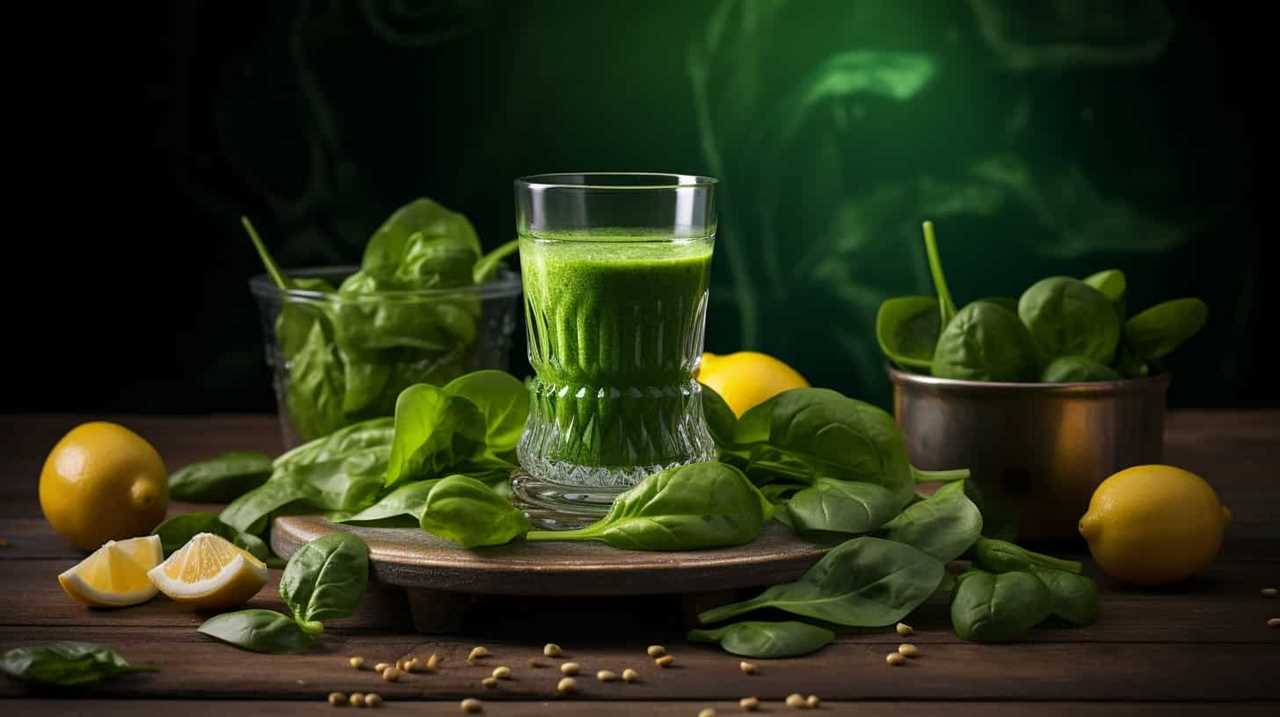
| Food | Folate Content (mcg) |
|---|---|
| Spinach | 58 |
| Lentils | 358 |
| Avocado | 81 |
| Orange Juice (8 oz) | 74 |
Thiamine
Orange juice is also a good source of thiamine, an essential nutrient that supports various bodily functions. Thiamine, also known as vitamin B1, is crucial for converting food into energy and maintaining a healthy nervous system. Here are some important facts about thiamine:
- Thiamine deficiency can lead to serious health issues, such as beriberi, which affects the nervous system and cardiovascular system.
- Good sources of thiamine include whole grains, legumes, nuts, and seeds, as well as fortified cereals and orange juice.
- Orange juice provides a convenient and delicious way to meet your daily thiamine needs.
- One cup of orange juice can provide around 0.2mg of thiamine, which is about 15% of the recommended daily intake for adults.
- Pairing orange juice with thiamine-rich foods can further enhance the absorption of this essential nutrient.
Ensuring an adequate intake of thiamine is crucial for overall health and well-being. Incorporating orange juice into your diet can be a tasty and nutritious way to meet your thiamine needs and prevent thiamine deficiency.
Magnesium
Continuing from the previous subtopic, another essential nutrient found in orange juice is magnesium.
Magnesium is a mineral that plays a vital role in various bodily functions. It’s involved in over 300 biochemical reactions, including energy production, muscle function, and nerve signaling. Consuming an adequate amount of magnesium is important for maintaining overall health and well-being.

Orange juice is a good source of magnesium, providing approximately 6% of the recommended daily intake per serving. Adequate magnesium intake has been associated with several health benefits, such as supporting bone health, regulating blood pressure, and improving mood and sleep quality.
Other sources of magnesium include nuts, seeds, whole grains, and leafy green vegetables. Including orange juice in your diet can contribute to meeting your daily magnesium needs and support overall health.
Antioxidants
Moving on to the next topic, let’s explore the role of antioxidants in orange juice. Antioxidants play a crucial role in promoting health and preventing diseases. Here are three key benefits of antioxidants in orange juice:
- Reduced oxidative stress: Antioxidants in orange juice help neutralize harmful free radicals in the body, reducing oxidative stress. This can protect cells from damage and contribute to overall well-being.
- Enhanced immune function: Orange juice contains antioxidants like vitamin C, which can boost the immune system. By strengthening the body’s defenses, antioxidants help fight off infections and promote a healthy immune response.
- Lowered risk of chronic diseases: Antioxidants have been linked to a reduced risk of chronic conditions such as heart disease, cancer, and neurodegenerative disorders. Regular consumption of orange juice can provide a rich source of antioxidants, supporting disease prevention efforts.
Including orange juice in your diet can provide you with these antioxidant benefits and play a significant role in disease prevention.

Fiber
Fiber plays a crucial role in our overall health and well-being. It is a type of carbohydrate that our bodies cannot digest, but it is essential for proper digestion and other important functions. Adequate fiber intake has numerous benefits, including promoting bowel regularity, reducing the risk of chronic diseases such as heart disease and diabetes, and aiding in weight management.
Here are some fiber-rich foods to consider incorporating into your diet:
| Food | Serving Size | Fiber Content |
|---|---|---|
| Beans | 1 cup | 15-16 grams |
| Avocado | 1 medium | 9 grams |
| Whole grains | 1 cup | 6-8 grams |
| Berries | 1 cup | 6-8 grams |
To ensure you are getting enough fiber, aim for a daily intake of 25-30 grams for adults. Remember to increase your fiber intake gradually and drink plenty of water to prevent digestive discomfort. Incorporating fiber-rich foods into your diet can help support your overall health and well-being.
Vitamin A
As we delve into the nutritional facts about orange juice, let’s now explore the importance of Vitamin A in maintaining our overall health and well-being. Vitamin A is a crucial nutrient that offers numerous benefits to our bodies. Here are three key benefits of Vitamin A:

- Promotes Healthy Vision: Vitamin A plays a vital role in maintaining good eyesight and preventing night blindness. It helps in the production of a pigment called rhodopsin, which is essential for proper vision.
- Boosts Immune System: Vitamin A is known to strengthen our immune system, helping our bodies fight against infections and illnesses. It supports the development and function of white blood cells, which are crucial for immune response.
- Supports Cell Growth and Reproduction: This vitamin aids in the growth, development, and maintenance of our cells, including those in the skin, hair, and nails. It also plays a role in the reproduction process.
Sources of Vitamin A include orange juice, carrots, sweet potatoes, spinach, and liver. Now, let’s move on to the next section about calcium, another essential nutrient for our well-being.
Calcium
One important nutrient found in orange juice is calcium, which is essential for maintaining strong bones and teeth. Calcium plays a crucial role in bone health by promoting bone growth and development, especially during childhood and adolescence.
Consuming orange juice, which is rich in calcium, can help support optimal bone health and reduce the risk of osteoporosis later in life. Additionally, calcium is important for dental health as it helps strengthen tooth enamel and prevent tooth decay. Regularly drinking orange juice can contribute to maintaining healthy teeth and gums.
It’s worth noting that orange juice fortified with calcium provides even higher levels of this essential mineral. Incorporating orange juice into your daily diet can be a convenient and delicious way to support both bone and dental health.
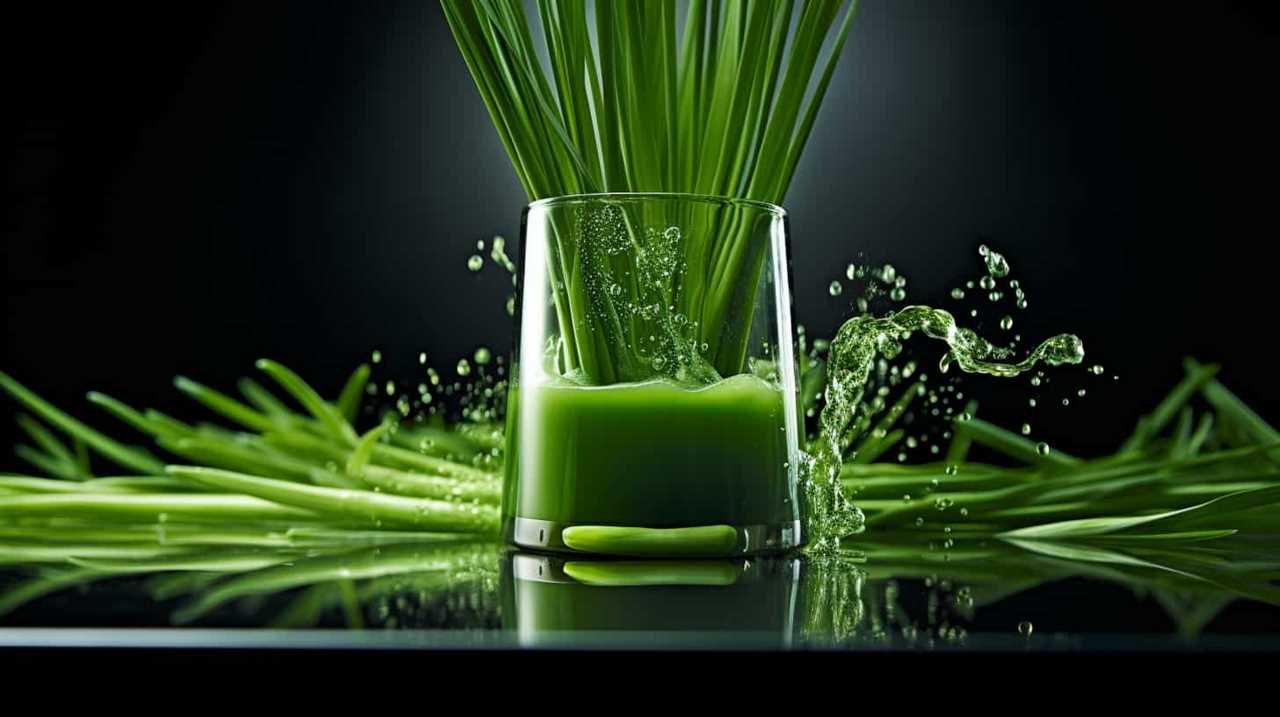
Iron
Iron is an essential mineral that plays a crucial role in the body, including the formation of red blood cells and the transportation of oxygen.
Orange juice contains a small amount of iron, but what sets it apart is its high vitamin C content, which enhances iron absorption.
This makes orange juice a beneficial addition to the diet, especially for individuals with iron deficiency or anemia.
Iron Absorption in OJ
We can enhance the absorption of iron by consuming orange juice. Orange juice (OJ) plays a vital role in aiding digestion and supporting the immune system. Here are three ways in which OJ promotes iron absorption:
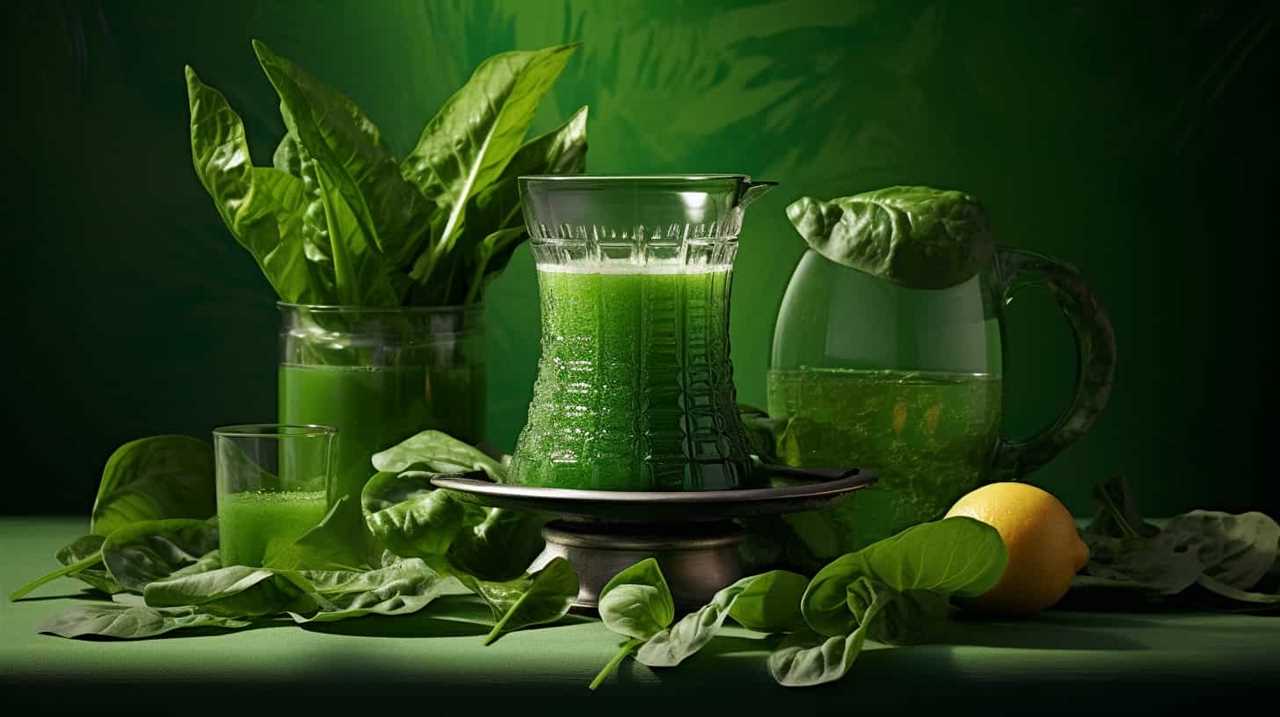
- Vitamin C content: OJ is rich in vitamin C, which helps convert non-heme iron (found in plant-based foods) into a form that’s easier for the body to absorb.
- Acidic environment: The citric acid in OJ creates an acidic environment in the stomach, which improves the solubility of iron and enhances its absorption.
- Bioactive compounds: OJ contains bioactive compounds like flavonoids, which have been shown to increase the bioavailability of iron.
OJ for Anemia?
Continuing from our previous discussion on iron absorption, let’s now explore how orange juice can be beneficial for anemia.
Orange juice isn’t only a refreshing beverage, but it also serves as a great source of vitamin C. Vitamin C plays a crucial role in the absorption of iron, which is essential for the production of healthy red blood cells. Anemia, a condition characterized by a lack of healthy red blood cells, can be improved by consuming orange juice alongside iron-rich foods.
Additionally, orange juice is known to boost the immune system due to its high vitamin C content. A strong immune system is important for overall health and can help prevent infections and diseases.
As we transition to the next section about phosphorus, let’s remember the importance of orange juice in supporting our immune system and aiding in the treatment of anemia.

Phosphorus
Phosphorus plays a vital role in our body’s overall health and is found in high concentrations in orange juice. When it comes to the phosphorus content ratio, orange juice contains approximately 12 mg of phosphorus per 100 grams.
This essential mineral is crucial for various bodily functions, such as bone and teeth formation, muscle contraction, and cell repair. However, it’s worth noting that not all phosphorus in orange juice is absorbed by the body. The bioavailability of phosphorus in orange juice is around 50%, meaning that only half of it’s absorbed and utilized by our bodies.
Factors like vitamin D levels, kidney function, and other dietary components can affect phosphorus absorption. Incorporating orange juice into a balanced diet can contribute to meeting your body’s phosphorus needs.
Carbohydrates
Orange juice is also a significant source of carbohydrates, which are essential for providing energy to our bodies. Carbohydrates are one of the three main macronutrients, along with protein and fat. They’re broken down into glucose, which is used by our cells as a source of fuel.

However, it’s important to be mindful of carbohydrates in certain health conditions. For individuals with diabetes, monitoring carbohydrate intake is crucial to manage blood sugar levels effectively.
On the other hand, carbohydrates can play a role in weight loss as well. Choosing complex carbohydrates, such as whole grains and fruits like oranges, can provide essential nutrients while keeping you full for longer.
Now, let’s dive deeper into the sugar content of orange juice.
Sugar
When it comes to sugar in orange juice, there are a few key points to consider.

First, orange juice contains natural sugars from the fruit itself, which can provide a sweet taste without any additional additives.
However, some brands may add extra sugar, so it’s important to check the label for added sugars.
Understanding the impact of sugar on our health and comparing the sugar content of different orange juice brands can help us make informed choices about our beverage consumption.
Natural Vs. Added Sugars
As we delve into the nutritional facts about orange juice, it’s important to differentiate between natural and added sugars. Understanding the difference can help us make informed choices about our diet and overall health.

Here are three key points to consider:
- Natural sweeteners: Orange juice contains natural sugars, which are found in the fruit itself. These sugars are accompanied by essential nutrients like vitamins, minerals, and antioxidants. When consumed in moderation, natural sugars can be part of a balanced diet.
- Added sugars impact: On the other hand, added sugars aren’t naturally present in orange juice but are added during processing. These sugars provide empty calories and can contribute to weight gain, tooth decay, and an increased risk of chronic diseases like diabetes and heart disease.
- Making healthier choices: To reduce your intake of added sugars, opt for freshly squeezed or 100% orange juice without added sweeteners. Be mindful of portion sizes and consider diluting your juice with water to further reduce sugar content. Remember, moderation is key when it comes to both natural and added sugars.
Impact on Health
The impact of sugar on our health can be significant, especially when considering the consumption of orange juice. While orange juice is a popular and seemingly healthy beverage choice, it’s important to be aware of the potential effects of its sugar content on our overall well-being.
Excessive sugar consumption, including that from orange juice, can have negative impacts on digestion. High sugar intake can lead to digestive issues such as bloating, gas, and discomfort. Additionally, the immune system can be affected by the consumption of sugary beverages like orange juice. Studies have shown that excessive sugar intake can weaken the immune system, making us more susceptible to illnesses and infections.
It is crucial to remember that moderation is key when consuming orange juice or any other sugary drinks. Opting for whole fruits or freshly squeezed orange juice with minimal added sugars can be a healthier choice for our overall health and well-being.

Sugar Content Comparison
To continue our exploration of orange juice’s impact on health, let’s now compare the sugar content of different varieties. When it comes to sugar alternatives, orange juice is naturally sweet and doesn’t require additional sugar. However, it’s important to note that orange juice contains naturally occurring sugars, mainly fructose. The glycemic index (GI) of orange juice varies depending on factors such as ripeness and processing methods.
Here is a breakdown of the sugar content in different types of orange juice:
- Freshly squeezed orange juice: Contains the highest sugar content due to the natural sugars present in fresh oranges.
- Concentrated orange juice: The water is removed to make it more concentrated, resulting in a higher sugar content.
- Light or reduced-sugar orange juice: Contains less sugar compared to regular orange juice but still provides the same nutritional benefits.
It’s worth noting that while orange juice does contain sugar, it also provides essential vitamins and minerals. Moderation and balance are key when incorporating orange juice into a healthy diet.
Frequently Asked Questions
Can Orange Juice Help With Weight Loss or Is It High in Calories?
Orange juice is a popular beverage, but does it help with weight loss or is it high in calories? We need to consider its caloric content and its impact on weight management.

How Does Orange Juice Compare to Other Citrus Fruits in Terms of Vitamin C Content?
Orange juice, compared to lemonade, has higher vitamin C content. Consuming citrus fruits, including orange juice, provides numerous benefits such as boosting immunity and promoting healthy skin.
Is Orange Juice a Good Source of Potassium and How Does It Compare to Other Potassium-Rich Foods?
Orange juice is a great source of potassium, which is essential for heart health. Compared to other potassium-rich foods, orange juice stands out as a hydrating and delicious option.
Does Orange Juice Contain Folate and How Does It Contribute to Our Overall Health?
Orange juice contains folate, an important nutrient that contributes to our overall health. It supports cell growth and development, helps produce DNA, and maintains a healthy nervous system. Orange juice and folate go hand in hand for our well-being.
Can Drinking Orange Juice Fulfill Our Daily Thiamine Requirement, and What Are the Benefits of This Vitamin?
Drinking orange juice can help meet our daily thiamine requirement. Thiamine plays a crucial role in energy metabolism and nerve function. The recommended daily intake of thiamine for adults is 1.1-1.2 mg.

Conclusion
In conclusion, orange juice isn’t only delicious but also packed with essential nutrients. With its high vitamin C content, it helps boost the immune system and promotes healthy skin.
Additionally, the potassium in orange juice supports heart health, while the folate and thiamine contribute to proper brain function. Its iron and phosphorus content are also beneficial for maintaining strong bones and energy production.
Just like a ray of sunshine, orange juice is a refreshing and nutritious addition to your daily diet.
Susannah expertise lies in researching and compiling evidence-based content on juicing, nutrition, and overall health. She is committed to ensuring that The Juicery World offers accurate, up-to-date, and trustworthy information to empower readers to take control of their health. Susannah’s goal is to inspire individuals to embrace juicing as a way to nourish their bodies and live their best lives.
Nutritional Value of Juices
What Nutritional Facts Impact Weight Loss in Juicing?

Are you interested in learning about the nutritional facts that can affect weight loss when juicing? We have all the information you need.
In this article, we’ll explore the calorie content of juices, the macronutrient profile, the fiber content, and the micronutrients found in juices.
We’ll also delve into the impact of sugar on weight loss when it comes to juicing.
So, get ready to embark on a journey of knowledge as we uncover the secrets behind juicing for weight loss.

Key Takeaways
- Calorie content and nutritional value in juices are crucial for weight loss goals.
- Homemade juices have higher levels of vitamins, minerals, and antioxidants compared to store-bought juices.
- Understanding the macronutrient profile of juices is important for weight loss.
- Juicing removes natural fiber, but it can be increased by adding pulp back or consuming whole fruits and vegetables.
Calorie Content of Juices
How can the calorie content of juices affect our weight loss goals?
When it comes to juicing, understanding the calorie content of the juices we consume plays a vital role in achieving our weight loss goals.
Comparing the nutritional value of homemade juices versus store-bought juices is crucial. Homemade juices often contain higher levels of vitamins, minerals, and antioxidants, as they’re made from fresh and natural ingredients.
On the other hand, store-bought juices may have added sugars and preservatives, increasing their calorie content and potentially hindering weight loss efforts.

Additionally, the role of antioxidants in weight loss with juicing can’t be overlooked. Antioxidants help to combat oxidative stress and inflammation in the body, promoting a healthy metabolism and aiding in weight management.
Being mindful of the calorie content and nutritional value of the juices we consume can positively impact our weight loss journey.
Macronutrient Profile of Juices
When considering the impact of nutritional facts on weight loss in juicing, it’s important to delve into the macronutrient profile of the juices we consume.
The macronutrients in juices include carbohydrates, proteins, and fats. Carbohydrates provide energy and are essential for proper bodily functions. Proteins are important for muscle repair and growth, while fats play a role in hormone production and nutrient absorption.

The macronutrient composition of juices can vary depending on the ingredients used. For example, fruit juices tend to be higher in carbohydrates, while vegetable juices may have a higher protein and fat content.
Understanding the macronutrient profile of juices is crucial for weight loss as it can affect nutrient absorption and satiety levels. By consuming juices with a balanced macronutrient profile, individuals can achieve a feeling of fullness and obtain the necessary nutrients for optimal health.
Fiber Content in Juices
To continue the discussion on the impact of nutritional facts on weight loss in juicing, let’s explore the fiber content in juices. Fiber is an essential component of a healthy diet and plays a crucial role in weight management. Juicing can be a convenient way to incorporate fiber into your diet, especially if you struggle to consume enough fruits and vegetables. However, it’s important to note that juicing removes some of the natural fiber found in whole fruits and vegetables. This is because the process separates the juice from the pulp, which contains most of the fiber. To give you a better understanding of the fiber content in juices, here is a table comparing the fiber content of some common fruits and vegetables before and after juicing:
| Fruit/Vegetable | Fiber Content (Before Juicing) | Fiber Content (After Juicing) |
|---|---|---|
| Apple | 4.4g | 0.2g |
| Carrot | 2.8g | 0.6g |
| Spinach | 2.2g | 0.1g |
| Beet | 2.8g | 0.1g |
As you can see, the fiber content significantly decreases after juicing. While juicing provides other health benefits, such as easy nutrient absorption, it’s important to consider the impact on fiber intake. To ensure you still get enough fiber, consider adding the pulp back into your juices or incorporating whole fruits and vegetables into your diet alongside juicing. By combining different juicing techniques and incorporating whole foods rich in fiber, you can maximize the health benefits of juicing while maintaining an adequate fiber intake.

Micronutrients in Juices
One important aspect to consider when discussing the impact of nutritional facts on weight loss in juicing is the presence of micronutrients in juices. Micronutrients are essential vitamins and minerals that our bodies need in small amounts for optimal health and functioning. When we juice fruits and vegetables, we extract these micronutrients and make them readily available for our bodies to absorb.
Here are four key benefits of juicing for overall health and detoxification purposes:
- Increased nutrient intake: Juicing allows us to consume a larger quantity and variety of fruits and vegetables, providing us with a higher concentration of micronutrients that may be lacking in our diets.
- Enhanced detoxification: Certain fruits and vegetables, such as leafy greens and citrus fruits, contain compounds that support the body’s natural detoxification processes, helping to eliminate toxins and promote overall well-being.
- Improved digestion: Juices are easier for the body to digest and absorb, allowing for better nutrient assimilation and supporting a healthy digestive system.
- Increased energy levels: The abundance of micronutrients in juices can help boost energy levels and promote vitality, allowing us to feel more energized and focused throughout the day.
Impact of Sugar on Weight Loss in Juicing
Juicing can have an impact on weight loss by considering the amount of sugar present in the juices we consume. While juicing provides a convenient way to consume fruits and vegetables, it’s important to be mindful of the sugar content in these juices.
One way to reduce sugar intake in juicing is by using sugar alternatives such as stevia or monk fruit extract. These natural sweeteners can provide the desired sweetness without adding unnecessary calories.

Additionally, considering the glycemic index of juiced fruits and vegetables can help in managing blood sugar levels and weight loss. Choosing fruits and vegetables with a low glycemic index can prevent spikes in blood sugar and promote satiety, ultimately aiding in weight loss.
Frequently Asked Questions
Can Juicing Alone Lead to Sustainable Weight Loss?
Juicing alone may not lead to sustainable weight loss. To achieve long-term effects, it’s important to consider sustainable weight loss strategies beyond juicing. Incorporating a balanced diet, regular exercise, and healthy lifestyle habits is key.
Is It Necessary to Count Calories While Juicing for Weight Loss?
Counting calories while juicing for weight loss can be a helpful tool. However, it’s important to remember that juicing alone may not be sustainable. Balancing juicing techniques with whole foods can maximize weight loss results.
How Does the Macronutrient Profile of Juices Affect Weight Loss?
The macronutrient composition of juices can impact weight loss by influencing metabolic rate. It’s important to consider the balance of carbohydrates, proteins, and fats in your juice recipes to optimize weight loss results.

Can the Fiber Content in Juices Help With Weight Loss?
The fiber content in juices plays a crucial role in weight loss. It aids in digestion, promotes satiety, and regulates blood sugar levels. Additionally, enzymes in juicing can enhance nutrient absorption and support gut health, further contributing to weight loss.
Are There Any Specific Micronutrients in Juices That Promote Weight Loss?
In juicing, specific micronutrients can impact weight loss. By consuming juices rich in vitamins, minerals, and antioxidants, our bodies receive the necessary nutrients for optimal health and weight management.
Conclusion
In conclusion, when it comes to weight loss in juicing, it’s important to consider the calorie content, macronutrient profile, fiber content, and micronutrients of the juices.
Symbolically, these factors represent the key elements that contribute to a balanced and effective juicing regimen.

By understanding the impact of sugar on weight loss and making informed choices, individuals can harness the power of juicing to support their weight loss goals in a healthy and sustainable manner.
Susannah expertise lies in researching and compiling evidence-based content on juicing, nutrition, and overall health. She is committed to ensuring that The Juicery World offers accurate, up-to-date, and trustworthy information to empower readers to take control of their health. Susannah’s goal is to inspire individuals to embrace juicing as a way to nourish their bodies and live their best lives.
Nutritional Value of Juices
What Makes Vegetable Juice Nutritionally Beneficial?

Are you aware that vegetable juice is filled with vital vitamins and minerals that support overall health and well-being?
In fact, it’s been found that drinking just one glass of vegetable juice a day can provide a significant boost to our immune system.
Not only that, but vegetable juice also contains antioxidants that can help protect our cells from damage.
In this article, we will explore the many nutritional benefits of vegetable juice and why incorporating it into our diet can be incredibly beneficial.

Key Takeaways
- Vegetable juice is packed with essential vitamins and minerals, including vitamins A, C, K, potassium, and magnesium.
- Vegetable juice is rich in antioxidants, which reduce oxidative stress and inflammation and play a crucial role in maintaining overall health.
- Vegetable juice supports digestive health by retaining dietary fiber, aiding digestion, and regulating bowel movements.
- Vegetable juice can aid in weight management by providing dietary fiber, promoting fullness, and reducing calorie intake.
Vitamins and Minerals
Vitamins and minerals play a crucial role in our overall health and well-being. They’re essential nutrients that our bodies need in small amounts for various functions like growth, development, and metabolism. When it comes to vitamin absorption and nutrient bioavailability, vegetable juice can be a great option.
Vegetable juices are packed with an array of vitamins and minerals, including vitamin A, vitamin C, vitamin K, potassium, and magnesium. These nutrients are important for maintaining a strong immune system, promoting healthy skin, and supporting optimal bone health. The liquid form of vegetable juice allows for easy absorption of these vitamins and minerals by our bodies.
Furthermore, the nutrient bioavailability in vegetable juice is high. This means that the vitamins and minerals present in the juice are readily available for our bodies to use. Unlike some other food sources, vegetable juice provides a concentrated dose of nutrients that can be quickly absorbed and utilized by our cells.
Antioxidant Content
As we delve into the topic of antioxidant content in vegetable juice, it is important to understand how these compounds further enhance the nutritional benefits discussed earlier. Antioxidants play a crucial role in our bodies by reducing oxidative stress and combating inflammation. These properties are key in maintaining overall health and preventing chronic diseases.

To give you a better idea of the antioxidant content in vegetable juice, let’s take a look at the table below:
| Vegetable | Antioxidant Content | Benefits |
|---|---|---|
| Spinach | High | Reduces oxidative stress and inflammation |
| Carrots | Moderate | Supports eye health and reduces inflammation |
| Tomatoes | High | Protects against heart disease and inflammation |
Digestive Health Benefits
To understand the digestive health benefits of vegetable juice, it’s important to explore how it aids in digestion and promotes optimal gut function. Here are four ways vegetable juice can support a healthy gut:
- Boosts the gut microbiome: Vegetable juice is rich in nutrients that nourish the beneficial bacteria in our gut, promoting a healthy balance of microorganisms.
- Provides fiber: Vegetables are excellent sources of dietary fiber, and juicing them retains much of this fiber. Fiber helps regulate bowel movements, supports the growth of good bacteria in the gut, and aids in digestion.
- Improves nutrient absorption: Vegetable juice contains enzymes that help break down nutrients, making them easier for the body to absorb. This can enhance nutrient uptake and overall digestive function.
- Supports regularity: The fiber found in vegetable juice adds bulk to the stool, promoting regular bowel movements and preventing constipation.
Weight Management Support
Vegetable juice can be a valuable ally in our weight management journey. When it comes to losing weight or maintaining a healthy weight, two important factors come into play: fiber intake and hydration levels.
Vegetable juice is a great source of dietary fiber, which can help us feel fuller for longer and reduce our overall calorie intake. Fiber also aids in digestion and prevents constipation, promoting a healthy digestive system.

Additionally, vegetable juice is rich in water content, which helps to keep us hydrated and can contribute to a feeling of fullness.
Immune System Boost
When it comes to supporting our immune system, incorporating vegetable juice into our diet can provide a valuable boost. Here are four reasons why vegetable juice is beneficial for our immune system:
- Cold prevention: Vegetables like broccoli, spinach, and bell peppers are rich in vitamin C, which helps strengthen our immune system and prevent colds.
- Allergy relief: Certain vegetables, such as carrots and sweet potatoes, contain beta-carotene, which can help alleviate allergy symptoms by reducing inflammation in the body.
- Antioxidant power: Vegetable juice is packed with antioxidants that help protect our cells from damage caused by free radicals, boosting our overall immune function.
- Nutrient density: Vegetable juice is a concentrated source of essential vitamins, minerals, and phytonutrients that support immune health, such as vitamin A, vitamin E, and zinc.
Frequently Asked Questions
Can Vegetable Juice Replace the Need for Taking Vitamin Supplements?
Using vegetable juice as a replacement for vitamin supplements depends on individual needs. While vegetable juice offers numerous benefits, it may not provide the same levels of specific vitamins found in supplements.
How Does the Antioxidant Content in Vegetable Juice Compare to That of Fruits?
When it comes to antioxidant comparison, vegetable juice packs a powerful punch. Its high antioxidant content rivals that of fruits, making it a nutritious choice for those seeking to boost their health.

Can Drinking Vegetable Juice Help With Conditions Like Irritable Bowel Syndrome?
Drinking vegetable juice can potentially aid in conditions like irritable bowel syndrome by promoting gut health and reducing inflammation. It’s important to consider the specific nutrients and antioxidants present in different types of vegetable juice for optimal benefits.
Does Vegetable Juice Have Any Impact on Reducing Cravings and Promoting Satiety?
Drinking vegetable juice can be beneficial for reducing cravings and promoting satiety. It provides essential nutrients and fiber while being low in calories. This can help control appetite and prevent overeating.
Can Vegetable Juice Improve the Body’s Ability to Fight off Common Illnesses Like the Flu?
Vegetable juice can improve our immune response and reduce inflammation, helping our bodies fight off common illnesses like the flu. It is nutritionally beneficial due to its high content of vitamins, minerals, and antioxidants.
Conclusion
Overall, vegetable juice is nutritionally beneficial due to its high content of vitamins, minerals, antioxidants, and its ability to promote digestive health, support weight management, and boost the immune system.
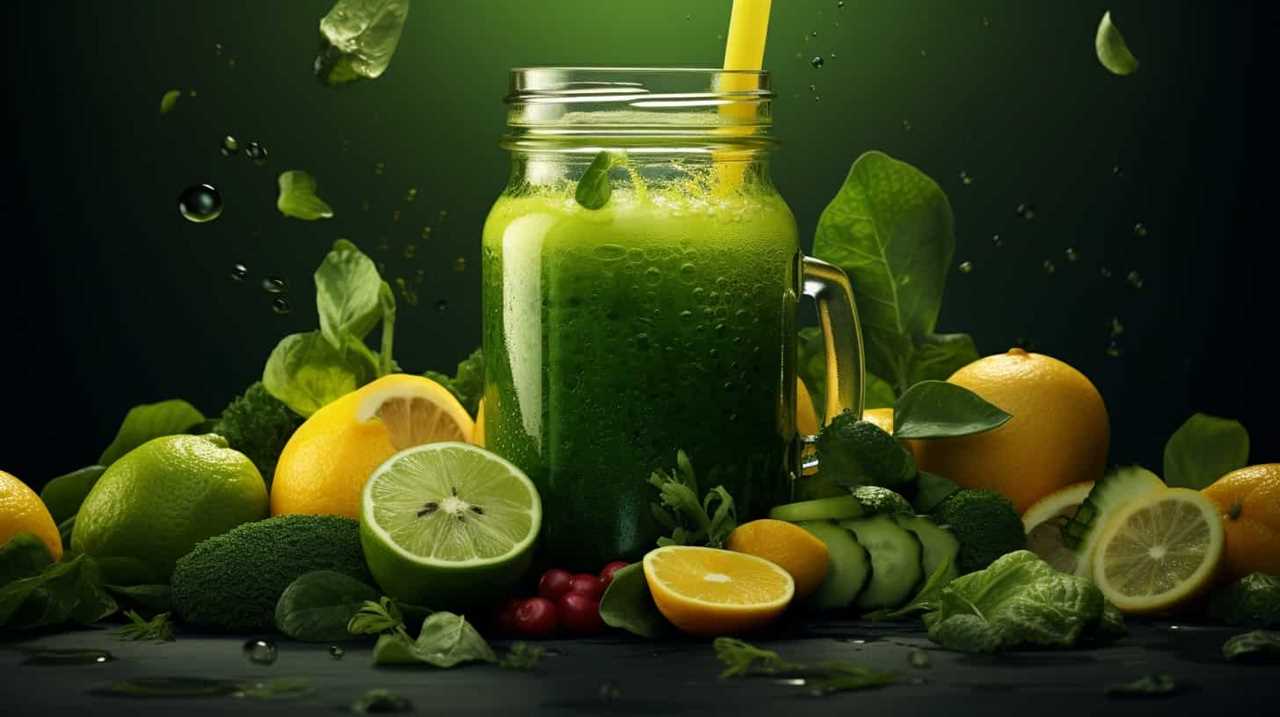
For example, imagine a busy working mother who struggles to incorporate enough vegetables into her diet. By incorporating vegetable juice into her daily routine, she can easily obtain the essential nutrients her body needs, leading to improved energy levels, better overall health, and the ability to be present for her family.
Susannah expertise lies in researching and compiling evidence-based content on juicing, nutrition, and overall health. She is committed to ensuring that The Juicery World offers accurate, up-to-date, and trustworthy information to empower readers to take control of their health. Susannah’s goal is to inspire individuals to embrace juicing as a way to nourish their bodies and live their best lives.
Nutritional Value of Juices
Fresh Fruit Juices: Unveiling Their Nutritional Profiles

Here we are ready to showcase the amazing benefits of fresh fruit juices and their exceptional nutritional content.
Join us on this journey as we delve into the calorie and sugar content, vitamin and mineral richness, antioxidant levels, and fiber content of these refreshing elixirs.
Brace yourselves for a bountiful array of potential health benefits that will leave you craving a glass of nature’s goodness.
Let’s sip, savor, and nourish ourselves with the power of fresh fruit juices.

Key Takeaways
- Fresh fruit juices can be high in calories and sugar, so they should be consumed in moderation and portion sizes should be considered.
- Whole fruits provide more fiber and help regulate blood sugar levels compared to fresh fruit juices.
- Fresh fruit juices are rich in vitamins and minerals, such as Vitamin C, Vitamin A, Folate, Potassium, and Calcium.
- Fresh fruit juices contain antioxidants that help protect the body from damage caused by free radicals and reduce the risk of chronic diseases.
Calories and Sugar Content
In this section, we’ll examine the calorie and sugar content of fresh fruit juices.
When it comes to choosing a beverage, many individuals opt for fruit juices as a healthier alternative to sugary sodas or other drinks. However, it’s important to understand the impact of juice alternatives on our blood sugar levels.
Fresh fruit juices can be a source of essential vitamins and minerals, but they can also be high in calories and sugar. While natural fruit sugars are better than added sugars, they can still affect blood sugar levels. It’s important to consume fresh fruit juices in moderation and consider portion sizes.
Opting for whole fruits instead of juices can provide more fiber and help regulate blood sugar levels.

Vitamin and Mineral Content
Moving on from the discussion about the calorie and sugar content of fresh fruit juices, let’s explore their vitamin and mineral content. Understanding the nutritional value analysis of these juices is essential for maintaining a balanced diet. Fresh fruit juices are known for their high vitamin and mineral content, providing a natural source of essential nutrients. They can be a great way to meet your recommended daily intake of vitamins and minerals. To give you a clearer picture, here is a table showcasing the vitamin and mineral content of some common fresh fruit juices:
| Juice Type | Vitamin Content | Mineral Content |
|---|---|---|
| Orange | High in Vitamin C, Vitamin A, and Folate | Good source of Potassium and Calcium |
| Apple | Contains Vitamin C and Vitamin K | Rich in Potassium and Calcium |
| Grapefruit | High in Vitamin C and Vitamin A | Good source of Potassium and Magnesium |
Antioxidant Levels
Let’s explore the antioxidant levels in fresh fruit juices.
Antioxidants are powerful substances that help protect our bodies from the damage caused by free radicals.
Fresh fruit juices contain a variety of phytochemical compounds that act as antioxidants. These compounds include vitamins, minerals, and other plant-based substances.
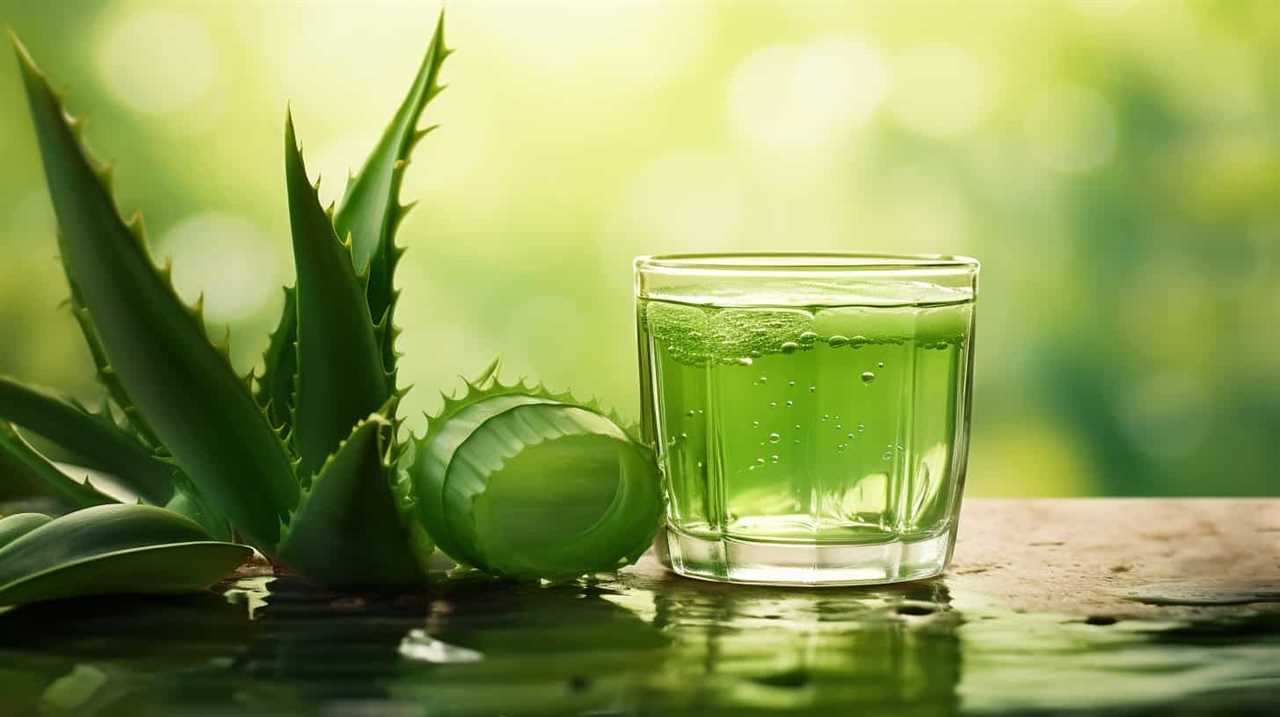
Antioxidants play a crucial role in maintaining our overall health and well-being. They’ve been shown to reduce the risk of chronic diseases such as heart disease, cancer, and neurodegenerative disorders.
Additionally, research suggests that antioxidants found in fresh fruit juices can have a positive impact on gut microbiota, promoting a healthy balance of bacteria in our digestive system.
Incorporating fresh fruit juices into our diet can provide us with a natural source of antioxidants, supporting our body’s defense against oxidative stress and promoting optimal health.
Fiber Content
The fiber content present in fresh fruit juices enhances their nutritional value and contributes to our overall health. Fiber is a crucial component of a healthy diet as it aids in digestion, regulates blood sugar levels, and promotes satiety.

When it comes to juice extraction methods, it’s important to note that certain methods, such as cold-pressing, retain more fiber compared to traditional methods like centrifugal juicing. This is because cold-pressing preserves the whole fruit, including the skin and pulp where most of the fiber is found.
To meet the recommended daily intake of fiber, it’s advisable to consume whole fruits rather than relying solely on fruit juices. However, incorporating fiber-rich fresh fruit juices into our diet can still provide some of the essential dietary fiber needed for optimal health.
Potential Health Benefits
We can experience numerous potential health benefits by incorporating fresh fruit juices into our diet. Fresh fruit juices provide an immunity boost and hydration benefits, among other advantages. The high vitamin C content in fruit juices, such as orange juice, can help strengthen our immune system and protect us against common illnesses. Additionally, the natural sugars in fruit juices provide a quick source of energy and can help replenish electrolytes after physical activity. Moreover, the high water content in fruit juices aids in hydration, keeping our bodies properly hydrated and functioning optimally.
Incorporating a variety of fresh fruit juices into our diet can provide a range of essential vitamins, minerals, and antioxidants that support overall health and wellbeing. It is important to note that while fruit juices offer these benefits, they should be consumed in moderation as part of a balanced diet, as excessive consumption can lead to an increase in sugar intake.

| Potential Health Benefits | Examples of Fresh Fruit Juices |
|---|---|
| Immunity Boost | Orange juice, grapefruit juice |
| Hydration Benefits | Watermelon juice, cucumber juice |
Frequently Asked Questions
Are Fresh Fruit Juices a Good Option for Weight Loss or Should They Be Avoided Due to Their Calorie Content?
Fresh fruit juices can be a good option for weight management. While they do contain calories, they also offer numerous health benefits. Including fresh fruit juices in a balanced diet can support overall health and provide essential nutrients.
Can Consuming Too Much Fresh Fruit Juice Lead to an Increase in Sugar Levels in the Blood?
Consuming excessive fresh fruit juice can lead to an increase in blood sugar levels. Additionally, it can have negative impacts on dental health due to its high sugar content. It’s important to consume fruit juices in moderation to avoid these potential risks.
Are There Any Specific Vitamins or Minerals Found in Fresh Fruit Juices That Are Particularly Beneficial for Boosting the Immune System?
Fresh fruit juices have immune boosting potential due to their high content of vitamins and minerals. Phytonutrients play a crucial role in strengthening the immune system. Incorporating fresh fruit juices into our diet can support overall health and well-being.
How Do the Antioxidant Levels in Fresh Fruit Juices Compare to Those in Other Types of Beverages, Such as Tea or Coffee?
Comparing antioxidant levels, fresh fruit juices offer a vibrant burst of nutrition compared to herbal infusions. We delve into the impact of these juices on heart health, providing evidence-based information for the benefit of others.

Is There a Significant Difference in the Fiber Content Between Freshly Squeezed Fruit Juices and Store-Bought Ones?
There is a significant difference in fiber content between freshly squeezed fruit juices and store-bought ones. Fresh juices have more fiber, which can help regulate blood sugar levels and promote overall digestive health.
Conclusion
In conclusion, fresh fruit juices can be a great addition to a healthy diet due to their high vitamin and mineral content, antioxidant levels, and potential health benefits.
However, it’s important to be mindful of their calorie and sugar content, as well as the lack of fiber compared to whole fruits.
Remember, when it comes to choosing juices, moderation is key – a glass a day will keep the doctor away!

Susannah expertise lies in researching and compiling evidence-based content on juicing, nutrition, and overall health. She is committed to ensuring that The Juicery World offers accurate, up-to-date, and trustworthy information to empower readers to take control of their health. Susannah’s goal is to inspire individuals to embrace juicing as a way to nourish their bodies and live their best lives.
-

 Juice Tips and Tricks3 weeks ago
Juice Tips and Tricks3 weeks agoHow To Make Homemade Pickle Juice
-

 Health Benefits of Juice1 month ago
Health Benefits of Juice1 month agoHow Much Bottled Lemon Juice Equals 1 Lemon
-

 Juice Tips and Tricks1 week ago
Juice Tips and Tricks1 week agoHow Much Lemon Juice Is Equal To Half A Lemon
-

 Juice Tips and Tricks2 weeks ago
Juice Tips and Tricks2 weeks agoHow Much Lemon Juice Concentrate Equals One Lemon
-

 Popular Juice Brands3 months ago
Popular Juice Brands3 months ago10 Top-Rated Organic Juice Brands to Try
-

 Popular Juice Brands3 months ago
Popular Juice Brands3 months ago9 Best No-Sugar-Added Popular Juice Brands
-

 Juice Tips and Tricks2 days ago
Juice Tips and Tricks2 days agoHow Long Can You Drink Orange Juice After The Expiration Date
-

 Juice Tips and Tricks1 month ago
Juice Tips and Tricks1 month agoHow Long Does Lemon Juice Last After Expiration Date










